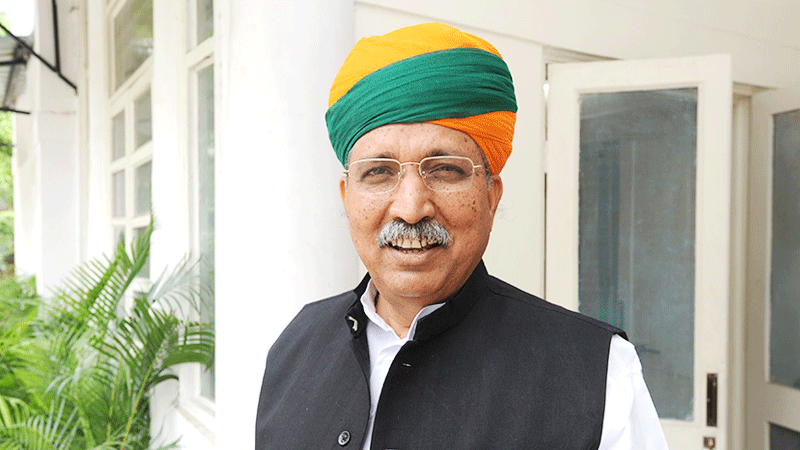The first legislative agenda of the new Parliament building has set the tone for women-led development as a way forward for the nation. The Modi government has shown zeal to turn this sankalp into siddhi
Arjun Ram Meghwal
In a democratic setup, a consensual decision carries a special significance for any remarkable change. It reflects the collective spirit of the transformational journey. Recently, Bharat has witnessed historic decisions of global resonance — one is the building of consensus on the Delhi Declaration as part of the G20 presidency, the other is the passing of Nari Shakti Vandan Adhiniyam. At a time when global geopolitics is beset with multi-pronged turmoil, these are jewels in the crown of the mother of democracy.
The first legislative agenda of the new Parliament building has set the tone for women-led development as a way forward for the nation. The Modi government has shown zeal to turn this sankalp into siddhi.
This has been a 27-year-long journey to give women their due share in representative democracy. In a very simplistic manner, the existing minimal share of nari shakti, which constitutes half the population, was a lacuna. Social dynamics had made women a mere decision-adherer rather than a decision-maker to some extent.
Numerous exceptions are there to counter this view: Women have broken the glass ceiling and have made the nation proud in every sphere. Now, the Narendra Modi government has prioritised this moral choice and showcased a strong will to correct
It is ironic that the US took 144 years to give equal voting rights to women after its independence. It took nearly a century of persuasion, protest and a World War to facilitate women’s suffrage in the UK. Our forefathers were visionary and ensured women’s voting rights immediately after Independence
this historical lacuna. The gender justice proposed by the Nari Shakti Vandan Adhiniyam in the legislative domain will provide impetus to balanced policy formulation.
It is ironic that the US took 144 years to give equal voting rights to women after its independence. It took nearly a century of persuasion, protest and a World War to facilitate women’s suffrage in the UK. Our forefathers were visionary and ensured women’s voting rights immediately after Independence. Now, after the 75th year of Independence, marking the era of Amrit Kaal, Bharat has taken a forward leap from that right to vote to extend women’s share of the right to represent in Parliament and legislative assemblies.
During the historic November 25, 1949, speech, Dr BR Ambedkar categorically asked how long one would continue to live a life of contradictions. He cautioned about social and economic inequalities. Over the last nine years, pro-poor and people-centric moves have resolved those contradictions. A testimony to this is the fact that more than 13.5 crore people have come out of poverty. The historic Nari Shakti Vandan Bill is another step to realise the spirit of one person, one vote and one value.
From another perspective, Indian philosophical values say that the perfect balance of feminine and masculine traits leads to a state of self-actualisation by bringing internal peace, harmony and individual fulfilment. It is up to us to utilise the natural potential of female sorority for the collective fulfilment and welfare of humanity.
Women’s innate qualities of perseverance, creativity, sacrifice, dedication, resilience and trust make the best ingredients for a leadership role without even taking leadership course certification from top management schools and universities. Just letting them have their rightful space will lead to enormous capacity-building and be a perfect model for others to emulate.
The Constitution (One Hundred and Twenty-eighth Amendment) Act is not a political step for the Modi government, but it is an article of faith. In July 2003, the BJP passed a resolution for women’s reservation in Parliament and state legislature at its national executive committee meeting at Raipur. Later, the Party executed this at the organisation level, and included it in its manifesto. Now, it has become an instrument of change for the entire nation. Calling a special session of Parliament and onboarding all political parties for a consensus-based decision was a Herculean task, which the government has done meticulously. For a few parties, who had opposed this noble cause earlier, their nod to it is not by choice but out of their political compulsion. The old Parliament building witnessed the Constitution-making exercise and transfer of power from the British, this new temple of democracy has marked further progressive sharing of that power under the umbrella of our Constitution.
The recently concluded G20 presidency has proved that Bharat matters a lot in amicably resolving global challenges. India is on the verge of becoming the third largest economy in the world and, parallelly, the nation will surpass the global average (26.7 per cent) of the percentage of women in national Parliament. Increasing their share from 15 per cent to 33 per cent will take it far ahead of many developed nations. Such profound measures will re-orient the nation’s outlook to become a women-led 21st-century leader.
For the implementation of provisions of this Nari Shakti Vandan Adhiniyam, the prerequisite constitutional obligation under Article 82 mandates prior census and delimitation exercise to identify women-led constituencies. The Modi government is committed to implementing it in accordance with this constitutional spirit. However, the pulse of change is being felt across the nation. The much-needed shift from a patriarchal mindset has gained currency. Let’s embrace this brighter era of thriving nari shakti leadership for building a developed Bharat.
(The writer is Union Minister of State (I/C) for Law and Justice, Minister of State for Culture and Parliamentary Affairs)


